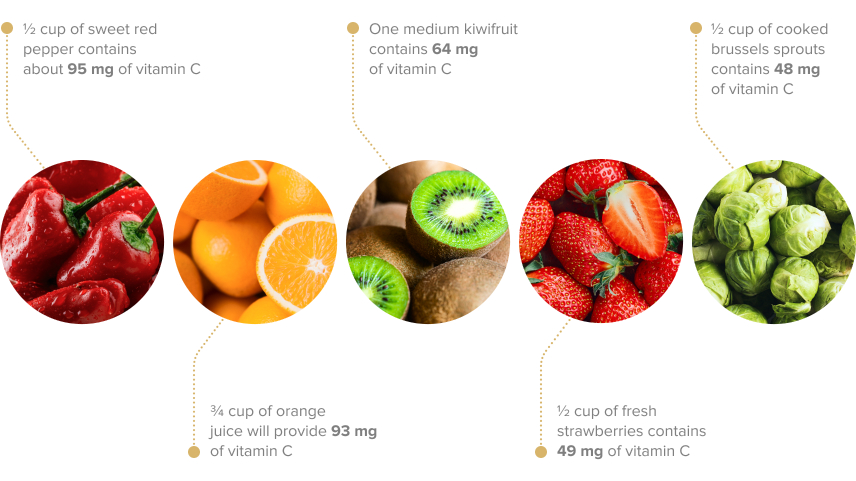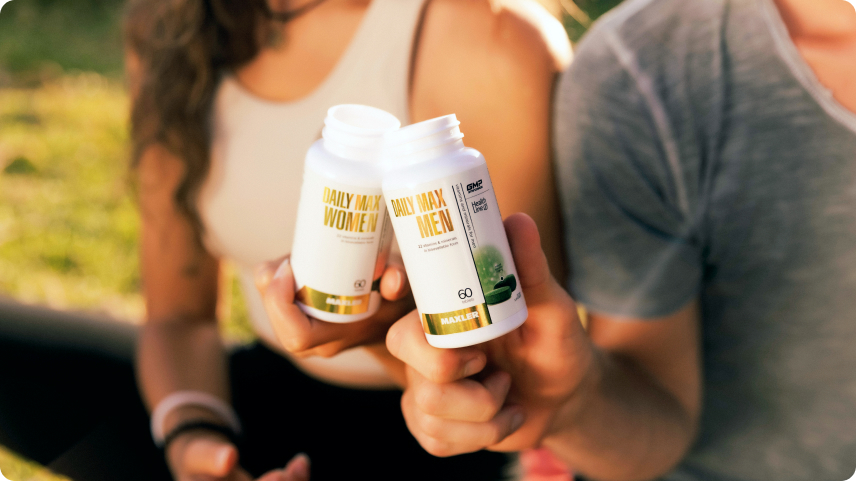Health Benefits Of Vitamin C

Vitamin C's Role in the Body
Vitamin C is involved in a variety of processes in the body. That's why if you include sufficient amounts in your diet, you can reap many benefits. Let's review some of the best benefits of vitamin C for men and women.
Boosts Immunity
Many people want to stay healthy all year. This requires a robust immune system. Vitamin C for immune health is indispensable.
You can learn all about the immune system in our post.
Vitamin C is an antioxidant that supports cell metabolism and protects many biomolecules from damage. It also supports the epithelial barrier, which is the first line of defence.
Vitamin C may be able to decrease the length of common colds and may help you resist certain respiratory infections. This can usually be achieved through high doses of vitamin C.
If you're trying to protect yourself from common colds or respiratory infections, you may benefit from increasing your intake of vitamin D, zinc, and selenium. Properly fuelling your immune system can help. Learn how to do so in our post.
Reduces Your Risk of Chronic Disease
Chronic diseases are often associated with oxidative damage, which can be lowered by vitamin C's antioxidant function. That's why people with a higher vitamin intake tend to have a lower risk of these illnesses.
Cardiovascular Health
The benefits of vitamin C for heart health are largely due to its antioxidant capacity and the support of collagen synthesis, which is key for our blood vessels. Having plenty of vitamin C daily correlates with a lower risk of cardiovascular disease.
It appears to be associated with a smaller risk of stroke and lower blood pressure. It may even support cardiovascular health in diabetic patients when combined with other medications.
Prevents Iron Deficiency
You might wonder – what does vitamin C have to do with iron? We need to get enough iron for our health. Iron is a crucial part of our red blood cells, helping us carry oxygen. Alongside carrying oxygen, it supports many cell processes, including energy generation.
We can get iron from many foods, including liver, red meat, certain beans and dried fruit.
Iron comes in two primary forms from food – heme iron, which is found in animal foods and non-heme iron. The iron in animal products is easier for the body to absorb as it has a higher bioavailability. We absorb about 25% of the heme iron. Iron from plants, however, is more challenging to absorb, with the body absorbing 17% or less of the iron.
That’s where vitamin C comes in. It is known to increase iron bioavailability because it acts as a chelate. This allows the iron we eat to be absorbed as it travels into the small intestine. In addition, it can reduce iron to a form that our cells can take up. That's why adding some vitamin C to meals rich in iron is a great idea. You can also support iron absorption by including animal meats alongside iron sources.
Its ability to help us absorb iron is one of the healthy benefits of vitamin C.
Improves Skin Health
Vitamin C is one of the critical nutrients for beauty. One of the key benefits of vitamin C for women and men is its participation in collagen formation. Collagen is an essential structural protein that our skin, bone, tissues, organs and nails require. It's the most abundant protein in the body.
Collagen is made from a few amino acids. These come together as long chains, after which three are intertwined to create a helical structure. This process relies on enzymes, active proteins in our cells, that use vitamin C to function. Vitamin C may also increase collagen synthesis to help with bone healing, which is excellent for athletes.
But that’s not the only benefit of vitamin C for skin health and beauty. Vitamin C is a powerful antioxidant. This can help protect our cells from UV and pollution, especially when combined with vitamin E. It may also help treat hyperpigmentation in the skin.
There are many benefits of vitamin C for skin. However, many of us would like to take care of both skin and hair health, ideally simultaneously. So, can the same be said about hair?
We’re still trying to understand what exactly vitamin C does in the hair. Some types of hair loss are associated with low iron intake. In these cases, additional vitamin C can help address that by helping absorb iron. However, the collagen-supporting and antioxidant properties of vitamin C can help support hair health.

Manages High Blood Pressure
Many of us have to watch our blood pressure, whether that’s by limiting salt intake or by increasing our movement. There is a connection between vitamin C and blood pressure. People with high blood pressure tend to have lower levels of the vitamin. A meta-analysis suggests that vitamin C intake may reduce blood pressure in short-term supplementation trials. However, there are some limitations to the conclusion, so we still need longer and bigger trials before we can conclude anything for sure.
Protects Your Memory
We all want to ensure we support our brains as we age. After all, we want to enjoy time with family and friends and reminisce about days past. Vitamin C is essential for developing our neurons, the cells of the brain that help transmit information across it. In addition, vitamin C is a key antioxidant that can help fight oxidative stress.
High intake of foods rich in antioxidants, such as vitamin C, E and carotene, can help delay issues with cognition that develop as we age. In addition, lower vitamin C levels may be associated with cognitive impairment and low moods.
How Much Vitamin C Is Enough?
Vitamin C is essential for health, but it can be difficult to understand what the requirements of this vitamin actually are.
How much vitamin C you need depends on a few factors. The general recommended quantities for vitamin C are as follows:
- Men and women between 14 and 18 years old – 45 mg a day
- Men above 19 years of age – 90 mg a day
- Women above 19 years of age – 75 mg a day
- Women who are pregnant – 85 mg a day
- Women who are lactating – 120 mg a day
- ½ cup of sweet red pepper contains about 95 mg of vitamin C
- One medium kiwifruit contains 64 mg of vitamin C
- ½ cup of cooked brussels sprouts contains 48 mg of vitamin C
- ½ cup of fresh strawberries contains 49 mg of vitamin C
- ¾ cup of orange juice will provide 93 mg of vitamin C

Many foods you eat daily can be enough to reach the Recommended Dietary Allowance for the nutrient. Remember that these recommendations are there to help you meet your minimal requirements rather than what you're supposed to eat every day.
If you’re meeting your requirements, you may wonder whether there’s a maximum that you need to watch out for.
Luckily, vitamin C isn’t super harmful at high intakes, with the most common side-effects of high vitamin C intake being gastrointestinal discomfort. This may include nausea, loose stool or cramps in the abdomen. If you’re worried about consuming too much vitamin C, here’s a handy list of upper limits for the nutrient:
- For women and men 14-18 years of age – 1,800 mg of vitamin C
- For men and women over 19 years of age, 2,000 mg of vitamin C is recommended. This also applies to breastfeeding and pregnant women.
Such large quantities of the vitamin aren’t typically found in food, so if food is your primary source of vitamin C, don’t panic. You’d have to drink 21.5 portions of orange juice to get this much vitamin C!
How To Take Vitamin C
Now that we’ve established your required doses of vitamin C, how can you meet them?
Vitamin C is best obtained from foods. Fruits and vegetables are great sources of the vitamin. You may also find grains fortified with it, which can help you get some extra vitamin C.
Cooking can affect the content of vitamin C. In general, the best technique to preserve vitamin C levels in food appears to be microwaving. The lowest levels of vitamin C retention appear to be in foods that are boiled. However, this tends to apply to vegetables and may differ depending on the vegetable you cook. In addition, drying and freezing may lower levels of vitamin C, so always consult the nutritional values of your foods to help you find the exact amounts of the vitamin per portion.
If you're getting vitamin C from foods such as fruit and vegetables, it's best to include them in your meals. Many foods rich in vitamin C make great on-the-go snacks and can be paired with sources of protein and fats for a more filling option. Eat foods rich in vitamins daily, as we cannot store or produce them.
However, not everyone manages to get enough vitamins from food. Or during the cold months we want more of the vitamin to support immunity. In that case, you may look for a dietary supplement with vitamin C. Some of the benefits of vitamin C supplements include them being relatively affordable, being easy to use and helping you get more of the vitamin.
Vitamin C supplements can be taken on an empty stomach. If you feel discomfort when taking it on an empty stomach, then simply take the supplement with food. Checking whether other supplements already have vitamin C is a good idea. It's a common addition to multivitamin complexes.
The choice can be overwhelming if you're planning to get a vitamin C supplement. Here are things to keep in mind when choosing it:
- Pick supplements with quality you can trust. All Maxler supplements are made in IFS and GMP-certified factories, which helps us adhere to high standards of quality for great products.
- Pick the right form of vitamin C. There are many forms of the vitamin available, but ascorbic acid is the most common one. Time-release vitamin C formulas improve absorption, and sodium ascorbate formulas are gentler on the stomach.
- Choose single or multivitamins. Vitamin C can be found in supplements with other vitamins and on its own. If you're taking supplements for a particular benefit, you may want multiple vitamins or minerals in combination with vitamin C. Alternatively, if you're looking for vitamin C only, choose supplements with it.
- What’s your preferred supplement form? Some people prefer taking pills, while others prefer powders that can be added to drinks or smoothies. Alternatively, gummies, effervescent tablets or liquid supplements can also be a good option.

At Maxler, we offer a range of vitamin C supplements. Our Vitamin C Gummies 500 mg or Multivitamin Gummies are a perfect way to make taking a vitamin pleasant and fun. They're made with pectin and contain natural fruit juices. Our multivitamin formulas, Daily Max Men and Daily Max Women, as well as VitaMen and VitaWomen, can also help you meet your vitamin C requirements.
Vitamin C is essential for our health. From supporting our skin beauty to heart health, getting enough of this nutrient is necessary. Ensure you incorporate foods containing vitamin C, or try supplements when you can't. Healthy eating is vital to a healthy life.







